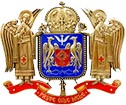


The message of His Beatitude Daniel, Patriarch of Romania, addressed to the participants in the 8th National Assembly Christ conveyed to children, organized by the Romanian Patriarchate in collaboration with the Ministry of Education and Scientific Research and World Vision Organization in Romania, at Caraiman Monastery, from 21 to 23 September 2015:
The National Assembly Christ conveyed to children celebrates today its 8th edition, being organized by the Romanian Patriarchate in collaboration with the Ministry of Education and Scientific Research and World Vision Organization in Romania.
Our Church is preoccupied today especially with the enhancement of the quality of theological education at all levels, starting with the theological seminaries and faculties, and up to religious education in schools or catechetic programs of parishes.
This concern derives from the immense responsibility of the Church to transmit religious faith, cultural and national identity, to educate the new generations of children and youth, following the exhortation of Saint Paul the Apostle: “Therefore, brethren, stand fast and hold the traditions which you were taught, whether by word or our epistle” (2 Thessalonians 2:15). This exigence regards the entire Church, but a special role is played by the professors teaching religion and the catechists from parishes.
The purpose of the educational act in religious school education and in parish catechesis aims towards forming the child and the young man in order to become faithful, loving Christ and the Church, capable of dialogue and cooperation in family and society.
Today’s Christian population of Romania is confronted with a more and more secularized approach to education, which aims at excluding the Christian contribution in the educational process, in exchange for a system limited only to the knowledge of the material, limited and passing world, without apprehending the work of God’s grace over creation and in people’s life.
The Holy Fathers of the Church were permanently preoccupied with the spiritual and intellectual growth of the faithful, and especially of the youth they shepherded. Both for their times, and over the ages, they proved to be guides or tutors who indicated the spiritual life and offered different solutions to major problems that concerned the society of their times, emphasizing the role played by education in the life of the society. In this regard, Saint Gregory the Theologian considered “as admitted by men of sense, that the first of our advantages is education” (Funeral Oration on the Great S. Basil, Bishop of Cæsarea in Cappadocia, Orations 43, 11).
Having as a model the forming and educational mission of the Holy Fathers of the Church, today’s Christian education must be dimensioned and realized according to the specific spiritual needs and capabilities of every age, i.e. the spiritual endowment of children and youth with the best fundamental moral and religious knowledge, in order to cultivate kindness and the beauty of the soul.
Therefore, Christian education of children and youth must not be limited to transmitting intellectual information, but should especially aim for the moral and spiritual formation of children and youth, shaping their character and personality according to the ideal of the Gospel of Christ’s love and according to the spiritual life of the Church. In other words, the final target of the religious and moral education must be the spiritual upbringing of children and youth in the love of God and fellow people, especially by involving them both in the liturgical life of the Church, and in the cultural, social and philanthropic activities of the parish community.
This endeavour implies a more intensive cooperation between the professor of religious education and the parish catechist, an involvement of both educational factors in the process of spiritual upbringing of children and youth. In this regard, a rethinking of the role and the vocation of the professor of religious education and of the catechist in the educational act is required. Since education in our country finds itself in a constant state of reform and transition, not only the purely informative aspect of the educational process has to be emphasized, but also the formative dimension of the pupil. It is well known that the current system stresses the cognitive aspect, often neglecting its harmonization with the affective and behavioural aspect of the person. That is why, intellectual knowledge about God must be accompanied by the knowledge of God through experiencing faith as an active participation in the Divine Liturgy and other services of the Church. Depriving children and youth of the communional and liturgical experience of the Church on a long term can cause indifference and their alienation from the living experience of the Church and from the formative and spiritual aspect, resulting in serious consequences for their spiritual life. It is exactly spiritual formation that offers a meaning to their life within family and society, and also to their orientation towards the eternal love of God, of the Most Holy Trinity.
We bless and congratulate all the educational factors animated by responsibility and sacrificial love, who were and are involved in this educational project that brings rich fruits in the missionary, pastoral, educational and catechetical activity of our Church.
†DANIEL
Patriarch of Romania